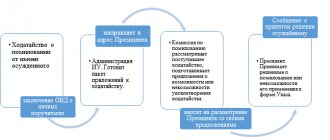Pardon is a very individual phenomenon. It can be taken against all convicted persons, regardless of their behavior in places of deprivation of liberty.
The convicted person, his mother, the public, or the president himself can ask for a pardon.
Depending on the person of the petitioner, corresponding types of petitions are distinguished. The head of state always had the opportunity to pardon a person who crossed the boundaries of what was permitted. A citizen’s unlawful acts can be forgiven if his personal merits or importance to the state outweigh the consequences of his crime.
Pardoning a convicted person may be based on the following reasons:
- the applicant has significant health problems;
- convicts have a record of service to the state;
- certain facts were not taken into account during the investigation;
- A person significant to the state or the public stands up for the convicted person.
If the petition for clemency is granted, the person may be released from the punishment imposed on him in full or in part.
General information
If any appeal does not help, then there is still hope - filing a petition with the country's guarantor. Legislation allows the president to unilaterally decide to release a citizen of the country from criminal punishment.
The pardon may be full or partial. However, by decision of the head of state, it is impossible to reverse the consequences of punishments already implemented. For example, a prisoner cannot be deprived of insignia or awards.
Motives for pardon and refusal
It is very important to understand what the actual motives for asking the president for a pardon will be to obtain forgiveness. They may be based on the following:
- serious services to the state;
- primary conviction;
- poor health of the person asking for pardon;
- intercession for the prisoner by the public or loved ones;
- advanced age;
- discovery of facts that were not taken into account when imposing punishment, considering the case, and so on.
Pardon will be unequivocally denied to a person who committed a crime while serving a suspended sentence. Applications from the following citizens will be rejected:
- if the applicant was previously subject to an amnesty;
- if a decision on pardon was previously made against the citizen;
- if mitigating measures have already been applied to the person.
Petitions from prisoners who have repeatedly violated law and order in prison will not be considered.
general information
Pardon has always been a very individual phenomenon. Pardon is an act issued by the head of state (i.e., the supreme representative of the government).
The content of a pardon may in one case free the convicted person from the punishment imposed by the court completely, and in another only partially.
If you look at history, you might be surprised where the origins of the right to pardon come from. Being one of the most ancient legal institutions, pardon was known to the subjects of King Hammurabi.
Medieval rulers also did not hesitate to apply such law in relation to their decisions.
True, the attitude towards convicts was quite subjective, although the procedure for pardoning convicts was partially prescribed in the legislation of England in the 16th century .
The institution of pardon is approved by religion, which in those days had significant weight.
Based on feelings of mercy and forgiveness, orders are given and the convicted escape punishment.
This is how the principle of humanity was laid down and human rights and freedoms began to be respected in the penal law of the Middle Ages.
Law
The legislative framework of the Russian Federation is huge and includes many laws and regulations.
If we talk about pardon taking into account the hierarchy of legal acts, then the fundamental provisions are contained in the Constitution of the Russian Federation, the Criminal Executive Code of the Russian Federation and Article 85 of the Criminal Code of the Russian Federation.
All these acts cover the entire range of provisions on pardon and are specified from the point of view of the legislator.
In addition to these legal blocks, there are Decrees of the President of the Russian Federation concerning issues of pardon.
In order to correctly understand the essence of pardon in Russia, it is necessary to familiarize yourself with the basic provisions about it.
Thus, the Constitution of the Russian Federation says that the highest value is the rights and freedoms of man and citizen.
In addition, every convicted person has every right to apply for a pardon or change the sentence towards mitigation.
Also, the Constitution states that the President of the Russian Federation has the right to pardon convicts.
And although there are many gaps in the pardon legislation, in recent years, as statistics indicate, prisoners are increasingly beginning to resort to such a right.
Right
Every person who has been convicted by a court can apply for a mitigation or cancellation of a sentence.
And despite speculation, the existence of such a right in no way depends on the crime of what gravity was committed.
The ability to ask for pardon has nothing to do with the personality of the convicted person.
Both exemplary prisoners and desperate rebels are equal in these rights.
So on what basis are convicts given such a right?
As a rule, a prerequisite for pardon is one or another fact that cannot attract attention.
For example, if the prisoner spent most of the assigned term outside his will and has now completely changed himself and changed his attitude towards life.
In such cases, pardon is permitted.
Who has it?
The right to pardon is granted to citizens of the Russian Federation, stateless persons, as well as foreigners who may be serving a sentence for a particular crime in Russia.
The legislation of the Russian Federation nowhere makes a framework regarding who can apply for a pardon.
Once again, it must be repeated that each case is particularly individual and requires detailed consideration.
Who has the right to appeal to the head of state
Any citizen has the right to submit a petition for pardon to the President of Russia. Even those sentenced to life imprisonment or those given a long period of detention are not deprived of this right.
The decision by the head of state is made individually. All facts that may influence the decision are considered.
Difference from amnesty
The two concepts - “amnesty” and “pardon” - have a number of distinctive features. The amnesty applies to persons who are selected based on general classification criteria. The decision to pardon is made exclusively in relation to a specific individual, that is, it is subjective.
The amnesty applies not only to persons against whom criminal proceedings have already been completed and a court decision has been made, but also to those against whom an investigation is still underway. Pardon is allowed only in cases where a court decision has already been made against the person.
After the request for pardon is granted, an act is issued, which is the basis for release from prison. If a person falls under the amnesty, then additional decisions and decisions are made and a certain procedural procedure is carried out.
A period of time
The current article of the Criminal Code regulating processes related to parole No. 79 provides for this possibility, subject to the following rules:
- The imposed punishment is imprisonment.
- The criminal reformed until the end of his punishment.
- Actual detention for a certain period of time.
| Gravity of the crime/special circumstances | Minimum part of the sentence served to receive parole |
| Small or medium | 1/3 |
| Heavy | 1/2 |
| Particularly serious / cancellation of previously assigned parole, in cases provided for by the Criminal Code | 2/3 |
| Crimes related to violations of sexual integrity of minors | 3/4 |
For any type of crime, the minimum period of serving a sentence in a correctional institution to be able to receive parole is six months.
For criminals who have committed illegal acts as minors, the possibility of release on parole occurs according to other temporary criteria - after serving 1/3 of the assigned term for all types of crimes, except for especially serious acts, for which 2/3 of the sentence is required.
For persons receiving a life sentence, the minimum term of service in a correctional institution is 25 years. To submit an application, the following condition must be met: over the previous three years, the convict has not committed any violations of order in a correctional institution. It is impossible to obtain parole for persons who, while serving a life sentence, committed crimes of a grave or especially grave nature.
Classification
Depending on the consequences, the following types of pardons are distinguished:
- with a reduction in the length of the sentence;
- complete release from isolation;
- changing the punishment to a less severe one;
- forgetting a criminal record.
Depending on the initiator of the petition, there are four types:
- Presidential. Submitted on behalf of officials of administrative and territorial units.
- Maternal petition for clemency. This type of appeal is most often made in practice. After all, any mother, regardless of the degree of guilt, loves and will protect her child. Such appeals are submitted to the Presidential Pardon Commission and are always given priority over other types of petitions. It is precisely on such requests that positive decisions are most often made.
- Personal.
- Public.
Statistics and case studies
Before the institution of a pardon commission was implemented in 2001, decisions on forgiveness were made in the thousands every year; for example, in 2000, their number was 8,650. The introduction of the existing system of gradual screening of applications made it possible to significantly reduce the number of those released under the act of pardon, among whom were previously repeat offenders. and persons who have committed crimes characterized by particularly serious consequences.
In recent years, the number of pardons has been sporadic; for example, in 2014, only 4 corresponding Acts were issued.
The following video will tell you about pardons in other countries:
Review procedure
Naturally, the President of Russia cannot consider all requests and delve into every situation. Therefore, until a document reaches his desk, it goes through a number of authorities.
First of all, the petition for pardon goes to the head of the institution where the applicant is serving his sentence. Then the application is transferred to the criminal-executive inspection, which supervises the specific correctional institution. After this, the petition is considered by a special commission, which forms its opinion on the received document on the possibility of making a decision on pardon. Such a commission is created at the local level and must consist of persons who have an impeccable reputation.
Only after this does the request go to the presidential administration, and then to the guarantor himself.
Cancellation of the decision on parole
Sometimes an offender released on parole may lose this privilege. But to cancel early release there must be compelling and legal reasons:
- committing a new crime during the probationary period. In this case, the court may impose an additional term of imprisonment;
- malicious failure to comply with court-imposed restrictions upon release;
- committing an administrative offense for which arrest is assigned (for example, a fight or petty hooliganism).
If you are serving time in a correctional facility, you can apply for parole. But only if specific conditions are met can you count on early release. You must repent, admit your guilt, take the path of correction and serve part of the assigned prison term.
If you intend to mitigate your punishment in this way, it is better to contact a lawyer in advance. He will advise you on the basic rules and nuances of filing an application and help you collect the necessary documents.
How to make a petition?
How to write a petition for clemency to the president? The document can be drawn up by hand and in free form.
A sample document structure looks like this:
- in the upper right corner the details of the recipient and the applicant are written down;
- Title of the document;
- a brief description of the situation in which the applicant was convicted, under which article of the Criminal Code and where he is serving his sentence, term;
- the essence of the requests and reasons that provide grounds for pardon;
- an indication of sincere repentance;
- if there is a positive characteristic from places of deprivation of liberty, then this should be mentioned.
At the end of the text, the date of compilation is indicated, a signature and full name are placed. You can list any facts that can really contribute to a positive resolution of the petition.
Grounds for deprivation of parental rights
Article 69 of the Family Code establishes an exhaustive list of grounds that allow you to file a claim for deprivation of the parental rights of a mother or father. To do this, it is established that the parents (or one of them):
- evade the fulfillment of parental responsibilities, including malicious evasion of child support payments;
- refuse, without good reason, to take their child from a maternity hospital (ward) or from another medical, educational organization, social service organization or similar institutions;
- abuse parental rights;
- children are cruelly treated, including physical or mental violence against them, and attacks on their sexual integrity;
- suffer from chronic alcoholism or drug addiction;
- committed an intentional crime against the life or health of their children, the other parent of the children, a spouse, including a non-parent of the children, or against the life or health of another family member.
IMPORTANT!
The presence of debt or a small amount of child support payments is not a sufficient argument for depriving parental rights. This fact is considered solely in connection with other manifestations of the guilty behavior of the parent (or both). Based only on this basis, it is impossible to file an application for deprivation of the parental rights of a father or mother (review approved by the Presidium of the Supreme Court of the Russian Federation on July 20, 2011).
There are situations when parents do not fulfill their responsibilities due to difficult circumstances and reasons beyond their control. This is, for example, a mental disorder or other chronic illness. The court has the right to make a decision on restrictions if there is a danger to the child, but will reject the application for the deprivation of rights. Law enforcement practice takes into account the specifics of each case (paragraphs 16-17 of the resolution of the plenum of the Supreme Court of the Russian Federation No. 44).
Applications
The documents that will be attached to the application are prepared by the administration of the place where the convicted person is serving his sentence.
This package includes the following documents:
- information about whether the material damage to the injured party is compensated;
- information about other periods of serving in the colony, whether an amnesty was previously applied to the applicant and whether there were decisions on parole;
- information about whether a petition for pardon was previously submitted, and if so, what was the result after its consideration;
- medical certificates from relatives of the convicted person, if the text of the document contains a reference to their poor health;
- characteristics of the convicted person;
- medical report on the condition of the convicted person;
- brief information about the crime committed and the court sentence;
- statement of the injured party for forgiveness of the convicted person (if any);
- personal details of the applicant.
And the last document that must be attached to the petition is a proposal from the colony leadership for a pardon.
The entire procedure for collecting and processing documents is given to the colony administration from 10 to 20 days. This date is counted from the moment the petition was filed and registered.
Additional documentation and help
The list of documents listed below can be provided voluntarily. The more documents you provide, the higher the likelihood of a positive outcome of the case.
1. A document confirming the difficult financial situation of relatives. The certificate must confirm the need for an additional breadwinner for the family.
2. Certificate of pregnancy. The document is provided by female gynecology.
3. Presence of children under age. To confirm this fact, you can provide a copy of the child’s birth certificate signed by a notary.
4. Mandatory employment. A letter from an employer who is guaranteed to provide a job for a convicted person after leaving prison. Such a document must convince the court that after leaving the place of imprisonment, the person will have no reason to commit a new crime due to lack of funds.
5. Certificate of registration. The court favors persons who know where they will live after their release. This fact significantly reduces the risk of committing a repeat crime.
6. Positive characteristics. For parole, the characteristics of persons who were in contact and communicated with the convicted person before the commission of the crime are important. Such characteristics play an important role when committing criminal acts of minor gravity.
7. Certificate of health of close relatives. If close relatives have serious illnesses and need to care for them, it is necessary to submit a certificate of their health from the district clinic.
8. Petitions from public organizations. They represent positive characteristics from companies and organizations that are ready to help a person adapt after serving a sentence.
9. Certificate of marital status. The document is certified by the Civil Registry Office. Married people adapt faster in life.
- Characteristics of the prisoner. Compiled by the head of the detachment where the convicted person served his sentence. The document is approved by the personal signature of the head of the colony.
- Certificate of wages that the convicted person received while working in the colony. After drawing up the document in the accounting department, it is certified by the head of production of the colony. The accrued salary for each month is indicated.
- Characteristics of the psychological state. After passing a special test and communicating with the person, the colony’s staff psychologist draws up a psychological profile of the prisoner. Puts his conclusions on paper.
Sample petition to the President for pardon on behalf of the mother
To the President of the Russian Federation
Putin V.V.
from (full name), living at the address...
year of birth…
Petition for pardon.
(Date) the court ... convicted my son - full name, ... year of birth, for ... under article ... And sentenced to ... years in prison. At the moment, my son has been away for... years... months.
I ask you to have mercy on my son... Full name for the following reasons:
- he has been brought to criminal responsibility for the first time and has not previously been found guilty of reprehensible behavior;
- the convicted person writes in his letters that he is fully aware of his guilt and repents;
- at the time of the crime, my son was intoxicated;
- I myself am very sick and need care, I am a group 1 disabled person, I recently suffered a heart attack;
- Apart from my son (full name), I have no other children or relatives, so there is no one to look after me;
- while serving his sentence, my son fell ill with tuberculosis and needs surgery;
- other grounds are prescribed that may influence a positive decision.
Based on the above, I ask you to pardon my son and release him from further serving his sentence.
Date of compilation, signature, mother’s full name.
Responsibilities of a person released on parole
It seems that this is the long-awaited freedom and you can start living. But that's not true.
The court may order you to comply with certain obligations upon parole. Restrictive measures are established for the unserved part of the sentence - the probationary period.
You will be prohibited from:
- change your place of residence, work or educational institution without written warning from the supervisory authority;
- visit casinos, night restaurants, bars and other entertainment venues;
- use of drugs or other psychotropic substances;
- communicate with former partners in crime or otherwise maintain contact with the criminal world.
The court may cancel established duties or assign new ones. If you have fulfilled all the requirements during the probationary period, then the sentence is fully served.
Peculiarities
How to write a petition for clemency and receive it? In fact, despite the fact that such petitions are filed quite often, positive decisions are made very rarely. In fact, although the president makes a discretionary decision, the petition is actually considered by the pardon commission, which is formed in each administrative-territorial entity. It is the members of this commission who make a decision and make recommendations on pardon or rejection of the petition.
But despite all this, you should always hope for the best. Moreover, mitigation of punishment is possible in relation to any guilty person; even those sentenced to life imprisonment and with the longest possible term have the right to apply.
How to apply for parole?
You must have been in prison for at least 6 months before submitting your application.
However, other terms have been established that must be served in prison. They depend on the severity of the crime committed and are calculated based on the punishment:
- 1/3 - for acts of moderate gravity;
- 1/2 - for serious crimes;
- 2/3 - when committing particularly serious crimes. It also applies if a prisoner has been released on parole but is returned to prison for failing to comply with parole requirements;
- 3/4 - for crimes of a sexual nature against minors, as well as for illegal trafficking in drugs and their analogues;
- 4/5 - for acts of a sexual nature against a minor.
It is believed that those sentenced to life imprisonment cannot qualify for such an incentive measure. But they have a chance to leave prison early if they meet additional conditions:
- served 25 years in prison;
- repented and want to start a new life;
- there is no need for their further imprisonment;
- over the previous 3 years of being in the colony there were no penalties for violating the rules.
If the above conditions are met, you can submit a petition. But first, the lawyer should:
- familiarize yourself with the criminal case for which you are serving a sentence;
- discuss possible options with you;
- meet with the administration leadership to find out their position on this issue.
This is necessary to assess the chance of a positive outcome of the case and develop the correct tactics of action.
Next, you and your lawyer need to submit a request for early release to the court through the administration of the correctional institution. Colony workers are obliged to review it and send it to court.
If the administration is against your release, it notifies the court in writing of the reasons for the refusal. But the decision remains with the latter.
The application is also accompanied by a response from the administration, which contains:
- assessment of your behavior - absence of penalties or violation of the regime, availability of incentives;
- mood for educational and work activities;
- your position towards the committed act.
If you are receiving an education in a correctional colony, then when considering your application, they will pay attention to your diligence and desire to receive an education, and not excellent grades.
Finding employment in a colony can be a difficult moment. Jobs in such institutions are limited. Therefore, this criterion cannot become a reason for refusing early release.
You can write the petition yourself or entrust the execution to your lawyer.
In any case, the application for parole must contain:
- name of the court where the petition is filed;
- information about the court verdict - when and by what court it was passed, for what offense, what the term of punishment was established;
- start date of serving the sentence;
- link to article 79 of the Criminal Code of the Russian Federation indicating the period of stay in prison;
- feedback on behavior and the possibility of further correction while at large;
- conclusion on the possibility of using parole;
- request for a benefit - reduction of the term;
- list of applications;
- your signature and date of compilation.
The colony administration may independently submit an application for parole without notifying you.
The application procedure goes through several stages:
- collection of required documents;
- their referral to the colony administration;
- transfer of documentation to the court;
- consideration of the application;
- making a decision on early release or refusal.
Your presence in court when the matter is considered is not mandatory. The court decides on this.
However, you can use the following rights:
- review case materials;
- give explanations;
- file petitions and challenges;
- send additional documents that the court must review.
Remember that the testimony of the victim is important in court. The judge listens to his opinion.
Even if you have repented, have positive feedback from the administration of the correctional institution and many incentives, you may be refused if the victim is against release. Therefore, it is better to find out his position in advance and, if possible, improve relations.
If you are denied release, a lawyer will help you appeal the negative court decision. He will send the appeal to the appellate and cassation courts. If these authorities consider that the refusal is justified, do not despair - you can submit a petition an unlimited number of times.










